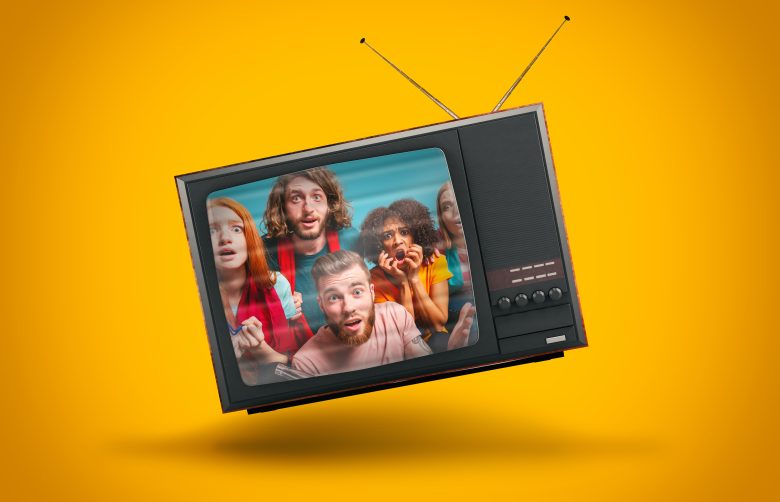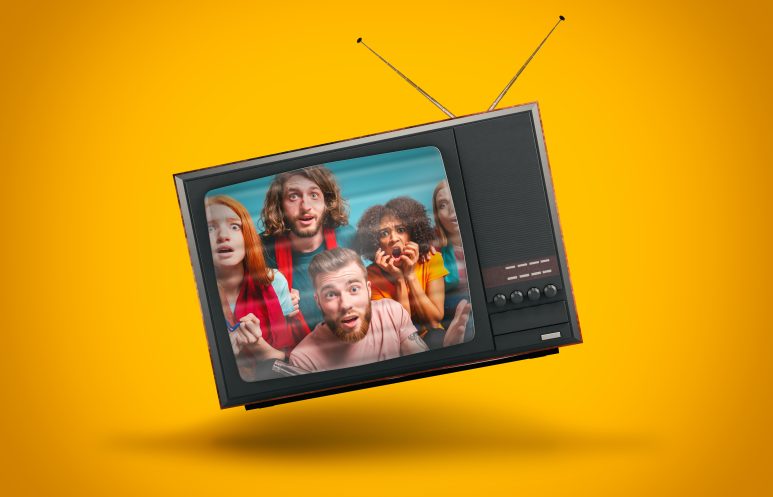By Anmol Irfan, freelance journalist
Near the end of the Netflix original AlRawabi School for Girls – a Jordanian show focused on an elite girls’ high school – Ghalia Zureikat stands in front of a poster board, presenting her clean energy solution as part of the student’s requirement to give a presentation on their future. While we’re used to seeing climate as a common topic in Westerns shows, where white characters can talk about anything and everything, whenever we see characters of colour, their storylines revolve around their identity and often fall into stereotypes.
This new approach of highlighting everyday topics through the lived experiences of characters of colour is what makes AlRawabi stand out in a sea of high school focused TV shows.

AlRawabi, which saw the release of its first season in 2021 and the second season this year, is all about challenging stereotypes, and changing the way young women’s experiences are talked about in Jordan.
A successful women-led TV team
Directed by Tima Shomali and produced and written by a women-led team, AlRawabi’s first season was released with subtitles in 32 languages across 190 countries and even dubbed into over 10 languages. It immediately gained popularity worldwide, hitting the Top 10 list on Netflix MENA and despite initially only being a mini-series, Netflix immediately renewed it for a second season.
AlRawabi challenges existing conversations on two fronts; locally, where in a conservative society like Jordan issues like mental health, relationships and abuse are not talked about, and globally, where audiences are not used to seeing young Arab women go beyond stereotypical perceptions. In both cases, AlRawabi becomes part of a growing movement in the media to influence change in the conversations and behaviours around them.
Researchers have pointed to earlier examples of this, like Sex In The City which gave a sense of empowerment to women. By taking the conversation global, shows like AlRawabi take this one step further. They allow global communities to understand – and support – each other better.
24 year-old Vee (not her real name), a Brazilian elementary school teacher says, “A friend from Egypt recommended the show to me, mentioning its discussion of important cultural issues. Being Brazilian, I watched it with Portuguese subtitles, eager to learn more about her culture.”
AlRawabi isn’t the only show that tells local stories with a global appeal. K-dramas have been doing this for years. Young women like Vee can use shows like AlRawabi to understand global communities, and even their friends better – in a way that Western perceptions of these societies would never allow. This isn’t a particularly new phenomenon, and Forbes’ K-drama critic Joan MacDonald compares the impact of these shifting stories to viewers in apartheid South Africa watching the Cosby show which influenced society to be more accepting of Black people in professional roles.
But outsiders aren’t the only ones that need convincing. Within Jordan there’s been a lot of conversation around the show and not all of it is praise. Creator Tima Shomali sees the criticism as a way to start dialogue and promote change in Jordan. While not everyone believes that media can alone bring about change, in this case, it shows that it has at least initiated the first step in the process – talking about it. And when it comes to major issues like honour killings and violence talking about it is a big step.
Mariam, Sarah and Tasneem
The first season follows 16 year-old Mariam, played by Andria Tayeh, who forms a revenge plot after having had enough of being bullied by the school’s popular clique. Throughout the 6 episodes, the show explores issues of class, bullying, and even violence and honour killing.
The second season has a completely new cast and focuses more heavily on the dangers of social media, although cultural norms and expectations still play a key role in making the show so appealing. Centred around Sarah, a student who feels all her problems will be solved if she finds social media fame, and the girls around her, season 2 goes deeper into the issues today’s generation face on an everyday basis. These include social media addiction, the desire for fame, the impact of childhood trauma at home, as well as bullying and mental health. When Sarah gains overnight fame following a viral TikTok, she suddenly gets everything she ever dreamed of, including the friendship of popular girl Tasneem and yet she soon has to deal with the consequences of the pressure fame brings.
These are still issues that are difficult to talk about in Jordanian society, and by having each episode end with resources and a call to action for anyone in need of mental health services and support, the show allows young Jordanians to feel like getting help is possible. Through its honest and raw portrayal of characters facing bullying, body shaming and social pressures, it’s already showing young Jordanians they are not alone.
Actress Ghalia Zureikat, who plays a classmate also addresses criticisms that the show portrays Jordanian society as more Westernised than it is, saying it simply reflects the reality of the younger urban generation.Shows like this help bridge the divide between generations, helping parents understand their children and their struggles in the modern world. Zureikat added that Jordan is a diverse country and one show cannot be expected to accurately represent everyone’s experience.
Each of the main characters in both seasons stands out on their own. We see complex, unique individuals with strong character development and back stories. Such media portrayals have the power to change the way women of colour, and women from the Global South are treated by white, Western communities in real life.
“POC [People of Colour] and LGBT+ characters are often included with superficial representation aimed at pleasing the younger audience. However, when they are not the main characters, their struggles are often glossed over, failing to explore the complexities of their experiences compared to those of white characters. This superficial treatment of the challenges faced by POC and LGBT+ individuals detract from their narratives and fails to provide a nuanced portrayal,” says Vee.
This doesn’t come without challenges. Censorship of taboo topics like honour killing or abuse – which AlRawabi also discusses – is common in the Middle East.
While AlRawabi focuses on some heavy cultural issues, it doesn’t take away from the everyday experience of a young high school girl. In many ways it acts as a mirror, in the way that so many shows of its kind have done so before.“I believe there will be a growing willingness to discuss the challenges posed by cultural beliefs on the lives of POC, fostering greater understanding and empathy toward their experiences. This can prompt proactive measures to provide support and address their hardships,” says Vee.
On X, young people have been loving the show, even if they might have issues with certain parts of it.
While the girls of AlRawabi may be fictional, the young men and women watching them have very real hopes and dreams and seeing themselves represented on screen can go a long way for their real-life aspirations. That’s not to say TV can change the world, but it does create hope amidst a group of young people who’ve felt unseen and ignored. In a society like Jordan, where conservativism and taboos have long hindered any sort of open conversations, this kind of representation can teach the younger generation how to change that.
Pictures from shutterstock.com
Disclaimer:
The views and opinions expressed in this article are solely those of the author and do not reflect the official policy or position of the Media Diversity Institute. Any question or comment should be addressed to [email protected]

